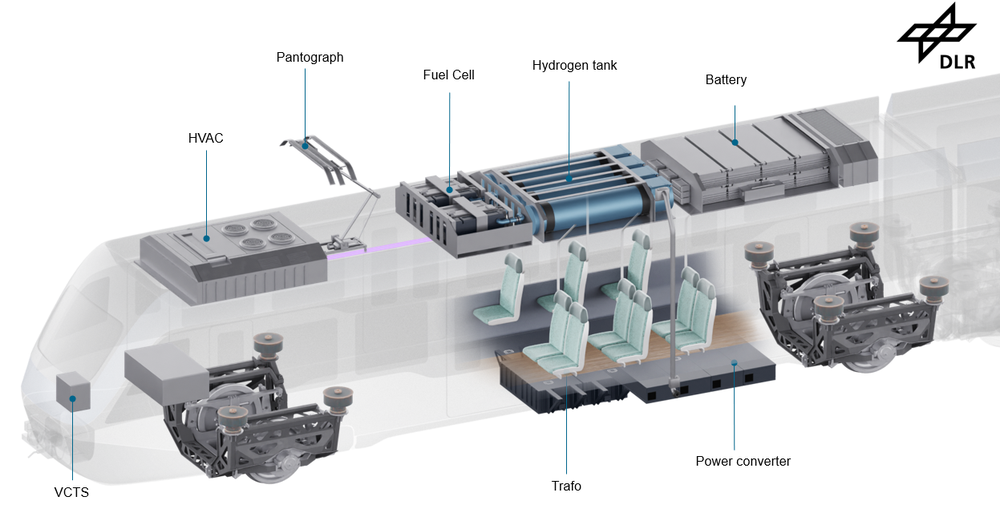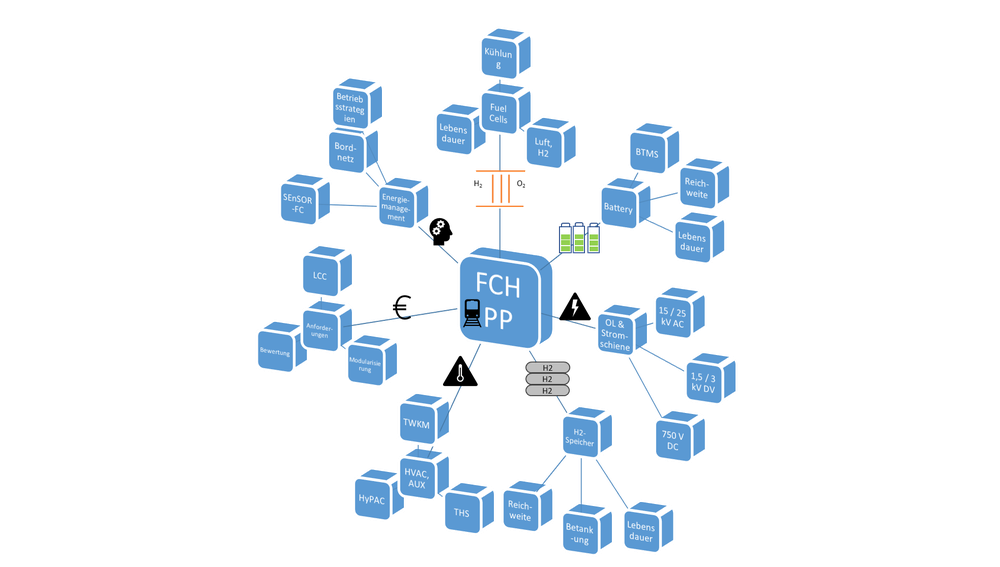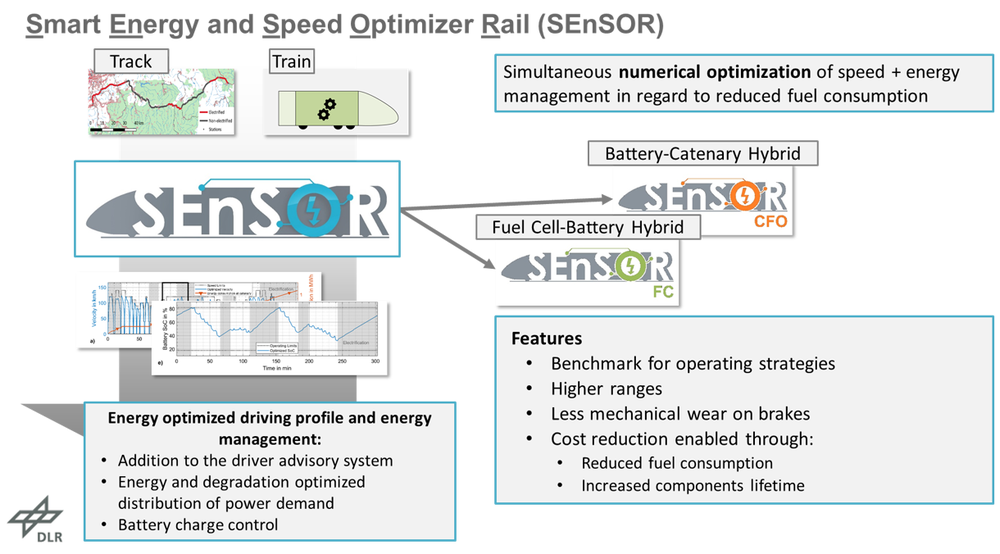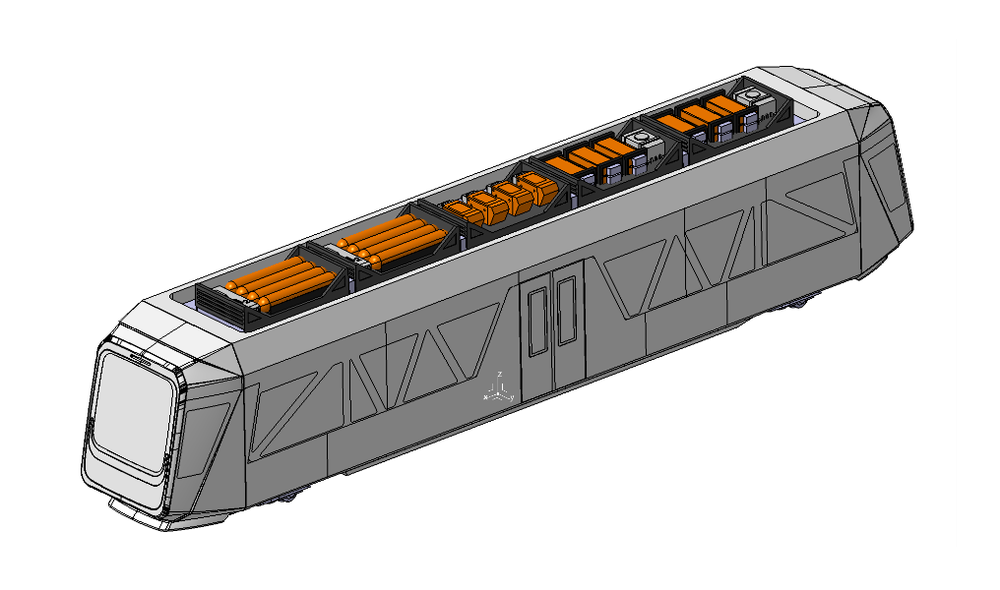The Fuel Cell and Hybrid Power Pack (FCHPP) concept is a modular system kit for alternative rail vehicle drives focussing on the battery, fuel cell and hydrogen tank components.
Goals are:
- Establishment of a modular approach for emission-free hybrid drive concepts
- Realisation of economical operation and reduction of life cycle costs
- Use in multiple units, locomotives and special vehicles
These scalable, modular and versatile energy storage systems and energy converters are suitable for new vehicles in various railway applications (multiple units, mainline and shunting locomotives) as well as for retrofitting existing trains.

With its basic modules, the FCHPP provides customised energy supply systems and architectures for rail vehicles. Scalable subsystems are used as modules with defined interfaces.
Another focus is on researching and analysing components and systems, in particular traction battery, fuel cell and hydrogen storage systems.

The research includes the energy technology design and conception of fuel cell and battery-based power packs (FCHPP) as well as the comparison and evaluation of drive and energy supply systems in rail vehicles.
To determine the requirements for the FCHPP, research and development partners are supported, use case analyses are carried out, real fleet data is evaluated and regional rail networks or individual routes are simulated. To capture the characteristics of the infrastructure, DLR researchers use extensive geodata models that draw on a mix of available data.
In this context, adjustments to the operating programme, the required refuelling and charging infrastructure and the resulting costs are also taken into account. The improvement of component operating strategies to reduce hydrogen consumption and the resulting component degradation are also considered by the DLR researchers.
DLR researchers develop and work with a diverse tool landscape for the simulation and design of FCHPP components and their energy management.
Methods and tools
DLR researchers are developing and applying software tools to carry out numerical optimisations of speed and energy management and to develop optimised component and system operating strategies:
- TPT - Longitudinal dynamic simulation tool for determining trajectories
- HybTool - Tool for rule-based energy management of fuel cell and battery trains
- RailTech - Monitor - Database with rail-compatible drivetrain components
- SEnSOR - Tool for simultaneous optimisation of speed and energy management
The SEnSOR (Smart Energy Speed Optimizer Rail) tool enables numerical optimisation of energy management and speed over time. This reduces electricity and hydrogen consumption and extends the service life of components. The tool can be used for BEMU, HEMU and bi-mode vehicles.

Further details can be found in the following publications:
Kühlkamp, Florian und Schenker, Moritz und Konrad, Marcel und Dittus, Holger (2022) Applicability and development of a direct method algorithm for simultaneous optimization of trajectories and energy minimizing control for hybrid fuel cell railway vehicles. Proceedings of the Institution of Mechanical Engineers, Part F: Journal of Rail and Rapid Transit. SAGE Publications. doi: 10.1177/09544097221128765. ISSN 0954-4097.
Rahul Radhakrishnan and Moritz Schenker (2024) Optimization algorithm for minimizing railway energy consumption in hybrid powertrain architectures: A direct method approach using a novel two-dimensional efficiency map approximation; Proceedings of the Institution of Mechanical Engineers, Part F: Journal of Rail and Rapid Transit. 2024;238(7):765-774. doi:10.1177/09544097241237836.
References
The expertise of DLR researchers is used in projects in collaboration with industry and research partners:
- FCH2Rail- Development of an FCHPP demonstrator in real use
- MOSENAS - Modular, scalable energy storage system for sustainable local rain passenger transport
- Feasibility study of alternative drive systems for shunting locomotives in Germany (dlr.de)
- Preliminary study on hydrogen shunting locomotive - Duisport (dlr.de)
- ProCo - Propulsion and Coupling | DLR Verkehr

